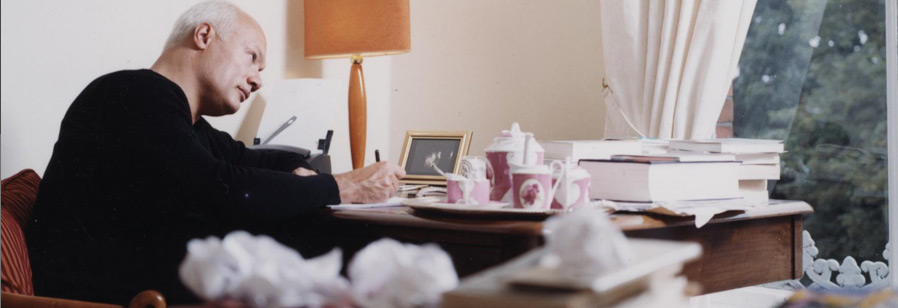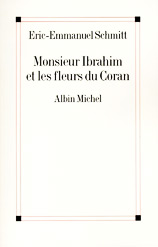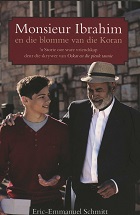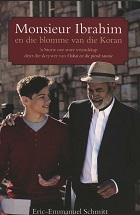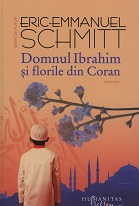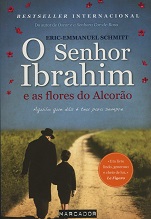Masterclass
Trailers
Monsieur Ibrahim et les Fleurs du Coran
x (x)
x (x)
x (x)
x (x)
x (x)
x (x)
View all trailers
- Home
- Literature
- Narratives
M. Ibrahim and the Flowers of the Coran
Summary
Second part of the 'cycle de l'invisible"
Paris in the 1960s. Thirteen-year-old Moses lives in the shadow of his less-than loving father. When he's caught stealing from wise old shopkeeper Monsieur Ibrahim, his discovers an unlikely friend and a whole new world. Together they embark on a journey that takes them from the streets of Paris to the whirling dervishes of the Golden Crescent.
Comments
« Brussels,16 November 2004 Eric-Emmanuel Schmitt »
There are some texts you carry around in you so naturally that you don't realise how important they are. Writing them is like breathing, and they seem to get written in an exhalation.
Monsieur Ibrahim and the Flowers of the Koran is a text like this. I wrote it in a few days for a friend, perched at the corner of a table. It came to me effortlessly without fuss or bother. I never dreamt it would be so successful and go around the world, still less that I'd become known in many countries as 'the author of Monsieur Ibrahim'.
Bruno Abraham-Kremer, a friend and actor, was spending a few days with me at my house in Ireland. He had been travelling in Turkey, where he'd crossed the arid landscapes of Anatolia on foot, visited Sufi monasteries, and whirled with dervishes in prayer. He came back full of the mystic poetry of Islam. We fell to talking about Rumi, a wonderful sage and writer, and about the humility he advised, about dance as a form of prayer. As we talked, my thoughts took off on a flying carpet towards the Orient.
Wisdom often has its roots in childhood, and we naturally enough began to remember our grandfathers who we realised had marked us in as much as we had loved them. Before the laughing, soothing images of our forebears, Monsieur Ibrahim was already taking shape. Then Bruno told me his family history; I described my own…
When Bruno Abraham-Kremer left, I promised to write something in which our love of the Islam he had experienced came together with our memories of adolescence.
In the event, he had hardly boarded the plane when I began scribbling. Momo spoke unbidden; I just had to listen to everything he dictated. A week later, I phoned Bruno Abraham-Kremer.
- 'I've got the text I promised you.'
- 'Oh, yes… have you started?'
- 'No, I've done it. Where are you?'
- 'In Paris, in the street.'
- 'I want to read it to you. Is there a bench around where you can sit down?'
- 'No. But there's the kerb… OK, I've got my feet in the gutter. Fire away.'
And I read him the adventures of Momo and Monsieur Ibrahim straight off. Now and again, he laughed in encouragement. Sometimes, I couldn't hear him.
- 'Are you still there? Can you still hear me?'
- 'I'm in tears…'
My last words to him, as I wound up the conversation, were that if he wanted to recite the narrative on stage, it was his for the asking.' After this, my thoughts turned to other things, and I immediately got involved in another piece of writing. For me, the matter was over. Written from the heart by heart, Monsieur Ibrahim inhabited a private universe, and I didn't really consider consigning it to the stage or even to the public. I wasn't allowed to get away with it.
Friends, family, my publisher - everyone was thrilled with the book. Far from being pleased, I was a bit annoyed by so many compliments, which seemed excessive: why were they so excited about these pages that had demanded nothing from me when I'd spend hours sweating blood over others? Like anyone else, I like things I've had to work at, things that cost an effort, because they improve my self-respect.
I was wrong. Sweat is not a sign of talent. What comes naturally is often better than sheer hard work; an artist should admit that some things come easily. This was the lesson I learnt from what happened to Monsieur Ibrahim.
Who are Momo and Monsieur Ibrahim?
Two people who pass unnoticed through the world. Momo is an only child with no mother, and a father who barely deserves the name of 'father', too sunk in depression to take care of his son and bring him up, or teach him and hand on to him a taste for life and its principles. As for Monsieur Ibrahim, the only thing anyone asks of him is that he give them the correct change. Both man and boy change their lives as they get to know one another. Their encounter is a marvellous enrichment.
There's been a lot of verbiage about the fact that the child is Jewish and the grocer Muslim. Rightly so. It was a deliberate move to create them like that. I set out to prove something and be provocative.
What I wanted to prove was that in many places in the world (European capitals, ports, American cities, North African villages), people of different religions from different backgrounds live together in harmony. In Paris, Rue Bleue, the road where this story takes place and where I once lived and which definitely isn't blue, was largely inhabited by Jews with a few Christians and Muslims. They all shared not only the same street, but daily life, their joys, discontents and conversation. Friendships or mutual understanding developed among these people who came from just about everywhere, either geographically or spiritually. In this unpretentious quartier down from Montmartre, I felt I was living somewhere rich and burgeoning, where cultures met, took an interest in each other and joked about their differences - like the old Jewish doctor who told the Muslim grocer that he would only celebrate Ramadan if he lived in Sweden where it was dark at three in the afternoon.
Sadly, the news we get from journalists only reflects what is going wrong, never what is running smoothly. It thus perniciously reduces Jewish-Arab relations to the conflict between Israel and Palestine, neglecting areas of agreement and peaceful cohabitation and giving weight to the idea of irremediable opposition. I don't want to deny the tragedy of the conflict, but one shouldn't confuse the world's real sounds with a part of the world or with journalistic and political fury. I felt it was important to tell a story of fraternity with a message of happiness. One of my proudest moments was when I discovered that in Israel, for instance, Arab, Christian and Jewish peace supporters use Monsieur Ibrahim and the Flowers of the Koran to try to spread their hopes, acting it out in the same theatre in Hebrew one night, Arabic the next.
The provocative element was to give a positive image of Islam at a time when monstrous acts of terrorism were distorting the Islamic faith. If today Islamicism is an insult to Islam, if it is infecting the planet, we should as a matter of urgency make a distinction between Islam and Islamicism, wrest from our minds the irrational fear of Islam and stop associating a religion, whose thousand-year old wisdom is an inspiration to millions of men and women, with the excessive and deadly scowl of certain militants.
Stories have their part to play in the life of the mind, even short stories about minor characters. Monsieur Ibrahim and Momo are united by a love that dismisses our fears of otherness and difference because it occurs simply in flesh and blood beings with emotions like our own.
Monsieur Ibrahim teaches Momo essential things: to smile, to talk, not to move too much, and to look at women with a look that comes from the heart not from lust. He reveals to him a more contemplative universe and even teaches him to accept death. All these things Monsieur Ibrahim has learnt from his Koran. They are things one could learn elsewhere, but Monsieur Ibrahim has learnt them from his Koran. 'I know what is in my Koran' he keeps saying.
When Momo is handed Monsieur Ibrahim's old copy, he finds what was in it: dried flowers. His Koran is the text but it is also what Monsieur Ibrahim has placed in it: his life, his way of reading, his interpretation. Spirituality is not about repeating sentences parrot-fashion, but about grasping the meaning and understanding the concept and shades of meaning, the implications. True spirituality is only worthwhile when obedience and freedom are balanced.
There you have the explanation I'm always asked for, the explanation of the mysterious title, Monsieur Ibrahim and the Flowers of the Koran.
Brussels,16 November 2004
Eric-Emmanuel Schmitt
Reviews
Paris-Match - « At a time when every shade of fanaticism ... »
At a time when every shade of fanaticism is rearing its head and religion drawing swords to win victory by force, Eric-Emmanuel Schmitt's fable, in which man is reconciled with himself, provides a marvellous antidote. [...] The simplicity and compassion of Schmitt's writing are truly affecting. [...] Laughter and tears are guaranteed at this superb show.
Hélène Kuttner
Telerama - « Beautiful and generous, full of light and tolerance ... »
Beautiful and generous, full of light and tolerance: such is Eric-Emmanuel Schmitt's story. Acted and produced with touching simplicity by Bruno Abraham-Kremer, it makes a wonderful, heart-warming show. Like an Arabian Night murmured softly in one's ear.
Fabienne Pascaud
Le Figaro - « A beautiful fable of spiralling threads,... »
A beautiful fable of spiralling threads, from the older man to the child, from Sufism to Judaism - two strands that interweave to form a ribbon of shimmering silk with deep contrasts. There's no lack of meaning but there are also the joy and freedom of sheer fantasy.
Armelle Héliot
Le Figaro Madame - « From the Rue Bleue to the crescent moon,... »
From the Rue Bleue to the crescent moon, Eric-Emmanuel Schmitt's story is funny, sensitive and serious. [...] Gravity and fantasy combine with infinite charm on this journey of self-discovery that ends with love of the self, the most important love of all, because it leads to reconciliation with other people. [...] One's only regret is that the story has to come to an end. A real treat.
Marion Thébaud
Le Parisien - « Pretty fable written by Eric-Emmanuel Schmitt ... »
Pretty fable written by Eric-Emmanuel Schmitt and admirably acted by Bruno Abraham-Kremer who conveys the ecumenical message in the grand tradition of Arabian story-tellers without for a moment losing any of his Jewishness and the sense of humour that is so naturally his. The novella is a delight, picturesque, funny, touchingly human but with ideas to teach.
André Lafargue
L'Express - « A stylistic gem, sparkling with emotion and humour,... »
A stylistic gem, sparkling with emotion and humour, that tells a simple tale of friendship between a Jewish lad, Momo, and the old Arab grocer of Rue Bleue in Paris. Eric-Emmanuel Schmitt reveals his 'alterity'. With an acrobatic flourish, he has realised Flaubert's dream to 'write a book about nothing, a book dependent on nothing external.'
Martine de Rabaudy
Le Figaro - « A Dickensian story »
A Dickensian story: Paris in the sixties, Momo is 13 and an orphan whose only friend is Monsieur Ibrahim, the Arab grocer from the Rue Bleue. This is a nickname, because Rue Bleue ('Blue Road') is not so blue, and Monsieur Ibrahim may be a Muslim but he is Turkish not Arabic. [...]It's almost uncomfortable to be this affected by a show. It may not convince you, but you can't fail to be moved by it.
Frédéric Ferney
V.S.D. - « Such simplicity, such proof of happiness »
Such simplicity, such proof of happiness inevitably set one thinking, particularly about oneself. A play that will win you over.
Arthur Georges
Le Pariscope - « Mr Ibrahim And The Flowers Of The Koran »
Eric-Emmanuel Schmitt has written a touching hymn to life. Momo's coming-of-age journey becomes ours. It is also a tour through grassroots Paris of the sixties when generous-hearted prostitutes jostled with the hoi-poloi. Schmitt is a first-class writer, unafraid to be wildly whimsical. [...] One ends up with a serious wish to be happy.
Marie-Cécile Nivière
Le Point - « A noble vision of human reconciliation. »
A noble vision of human reconciliation. A show to recommend to all those who think Islam a hysterical religion.
Frédéric Ferney
Le Figaroscope - « Mr Ibrahim And The Flowers Of The Koran »
Eric-Emmanuel Schmitt has written a beautifully sensitive monologue. The temptation to be otherworldly make it no easy task, but Schmitt is adept at avoiding the hazards of fine sentiments and resists laying bare his religious feeling. A real feel-good show that owes much to Bruno Abraham-Kremer's powerful and moving performance. Alone on stage, he exudes his wonderful human compassion.
Jean-Luc Jeener
Actualité Juive - « East meets West... »
East meets West. [...] A veritable hymn to tolerance, and to fellow-feeling not only between two men of different origins but between adult and child. A refreshing and delightful show.
Michèle Lévy-Taieb
La Tribune - « At a time when peace seems to be in its death ... »
At a time when peace seems to be in its death throes in the Middle East, this uplifting show about interreligious relationships explodes all the snares and clichés without once descending into cloying otherworldliness or irritating partisanship. [...] A truculent show to enjoy with all the family.
Yasmine Youssi
Impact Médecine - « En route, Monsieur Ibrahim hands... »
En route, Monsieur Ibrahim hands down to Momo the magic password of 'true self-love' which alone can bring reconciliation with oneself and therefore with other people. His grocer's shop is a cornucopia.
Jean-Michel Ulmann
Publications
- In Albanian language, published by Asdreni
- In Arabic, published by Dar Al Shorouk
- In Basque, published by Erein, 2006
- In Bulgarian, published by Lege Artis Publishing House
- In Castillan language, published by Ediciones Obelisco, 2003, and published by Ediciones Destino in 2007
- In Catalan language, published by Editorial Cruilla
- In Chinese, published by Eurasian Publishing, 2005, translated by Lin Ya-Fen
- In Croatia, published by Edicije Bozicevic
- In Danisch, published by Bjartur/HR Ferdinand, 2004, translated by Elisabeth Ellekjaer: Monsieur Ibrahim og Koranens blomster
- In Dutch, published by Uitgeverij Atlas, 2004, translated by Eef Gratama: Meneer Ibrahim en de bloemen van de Koran; Published by Wolters-Noordhoff in french (School); in soft cover published by Fisher.
- In American English, published by The Other Press, 2003, translated by Marjolijn de Jager
- In English (UK), published by Methuen
- In Estonian language, published by Varrak
- In Finnish, published by Like Publishing, 2005, translated by Mrja Haapio: Monsieur Ibrahim ja Koraanin Kukkaset
- In Galician, published by Faktoria K de Libros (Vigo- Pontevedra)
- In Georgian language, published by Bakur Sulakauri
- In German, published by Ammann Verlag, 2003, translated by Annette and Paul Bäcker
- In Greeks, published by Opera Book, 2002
- In Hebrew, published by Kinneret-Zmora-Dvir Publishing, 2002
- In Hungarian, published by Europa konyvkiado, 2005, translated by Balla Katalin: Ibrahim ur es Koran viragai
- In Icelandic, published by Bjartur Reykjavik, 2004, translated by Guorun Vilmundardottir pyddi: Hr Ibrahim og blom koransins
- In Italian, published by Edizioni e/o Roma, 2003, translated by Alberto Bracci Testasecca: Monsieur Ibrahim e i fiori del Corano
- In Japanese published by Yumiko Ban
- In Korean, published by Munkhak Segye-sa publishing co, 2005, translated by Rosa Han
- En lituanien,published by Alma littera, 2005
- In Norwegian, published by Lanser Forlag, 2002, translated by Willy Flock: Herr Ibrahim og Koranens blomster
- En langue perse
- In Polisch, published by Wydawnictwo Znak, 2004, translated by Barbara Grzegorzewska: Pan Ibrahim I kwiaty Koranu
- In Portuguese, published by Ambar, 2003, translated by Carlos Correia Monteiro de Oliveira: O senhor Ibrahim e as flores do Corao
- In Portuguese (Brazil), published by Editoria Nova Fronteira, 2003, translated by Jannaina Senna: Sur Ibrahim e as flores do Corao
- In Russian, published by Azbuka, 2004
- In Serbian, published by Laguna, 2001, translated by Ana Stosic : Gospodin Ibrahim I evetovi iz Kurana
- In Slovenian, published by Vale-Novak
- In Swedish, published by Storm Forlag, 2004, translated by Till Svenska and Asa Larsson
- In Turkish, published by Bilge Kültür Sanat, 2004, translated by Bahadirhan Bozkurt
- In Ukrainian language, published by Calvaria
